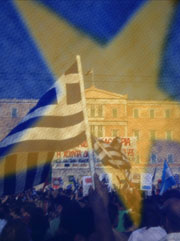 The first green shoots have begun to emerge in money supply data from across the world, raising hopes of a tentative global recovery by later this year. Data collected by Simon Ward at Henderson Global Investors show that a key gauge of global money – six-month real M1 – has picked up at last after a drastic slowdown over the early spring. The combined growth rate for the G7 economies and E7 emerging powers levelled out at 1.6 per cent in May and rebounded at 2.5 per cent in June, though China and India are still contracting. The M1 data measure cash and overnight deposits and are a leading indicator of industrial output six months ahead. They give some comfort that the latest growth scare will stop short of outright slump, the point where “feedback loops” set off a self-feeding downward slide, The Telegraph reports.
The first green shoots have begun to emerge in money supply data from across the world, raising hopes of a tentative global recovery by later this year. Data collected by Simon Ward at Henderson Global Investors show that a key gauge of global money – six-month real M1 – has picked up at last after a drastic slowdown over the early spring. The combined growth rate for the G7 economies and E7 emerging powers levelled out at 1.6 per cent in May and rebounded at 2.5 per cent in June, though China and India are still contracting. The M1 data measure cash and overnight deposits and are a leading indicator of industrial output six months ahead. They give some comfort that the latest growth scare will stop short of outright slump, the point where “feedback loops” set off a self-feeding downward slide, The Telegraph reports.
Europe’s single market for financial services is fragmenting as regulators put pressure on banks to retreat behind their national borders amid mounting fears of a euro break-up, officials and analysts have warned. Analysis from Goldman Sachs yesterday showed the degree to which banks across Europe have reined in crossborder lending, leading to a deep decline in flows of credit from Northern Europe to the South. The trend is being driven in part by national supervisors, which are pushing local banks to build up capital and liquidity at the expense of other EU countries, The Times reports.
The Bank of England is expected to slash UK growth forecasts to close to zero from the 0.8% predicted in May when it releases its quarterly inflation report later today. The central bank will also downgrade inflation forecasts amid a weak economy in a double-dip recession that has been hit by the Eurozone crisis and slowing domestic demand. Presenting his last report in May, he said the UK would not be “unscathed” by the Eurozone “storm”. Governor Sir Mervyn King is also expected to be asked about a possible interest rate cut from the current record low of 0.5%. The Bank is expected to say in its August Inflation Report that the British economy will come to a standstill this year with virtually zero growth in 2012 as a whole, opening the door to more stimulus in the coming months, The Telegraph says.
The sizes of Standard Chartered’s alleged sanctions problems could be $250bn or $14m depending on how the US law is ultimately interpreted by federal regulators and Federal Bureau of Investigation agents pursuing the inquiry into the bank. At issue is an exemption to US sanctions law that prohibits banks acting in the US from doing business with specific nations, including Iran. StanChart used an exemption, known as a U-turn, that permitted US banks to process payments from Iranian entities so long as the transactions were initiated offshore and passed through the US only for dollar clearing before being routed back to banks offshore. The U-turn exemption was revoked in 2008. As well, the US regulator, the DFS, has alleged StanChart violated the federal sanctions law by “wire stripping” – removing codes from money transfers that would have identified Iranian clients, affecting $250bn of transactions. Lawyers involved with sanctions work say it is a grey area. Prior cases brought by the US Treasury, Federal Reserve, Department of Justice and Manhattan district attorney’s office against other banks have not included that allegation, the lawyers note, in part because it is viewed as less egregious than the millions of dollars of transactions that more clearly violated the law. Treasury has not commented on DFS’s allegations relating to the U-turn transactions, The Financial Times reports.
Heineken’s $6bn bid for Asia Pacific Breweries (APB) faces a challenge from a group linked to Thai billionaire Charoen Sirivadhanabhakdi, which could force the Dutch brewer to pay more to control the maker of Tiger beer. The world’s third biggest brewer has to decide whether to raise its bid or risk losing control of one of Asia’s fastest growing brewers to the family of Thailand’s second richest man. Heineken agreed to buy stakes in the Asian brewer held by Singapore conglomerate Fraser and Neave (F&N) last Friday, only for the Thai group to now muscle in on the deal with a higher price for F&N’s 7.3% direct stake. Kindest Place Groups, a vehicle owned by Charoen’s son-in-law, made a surprise offer of S$55 a share to buy F&N’s direct stake in APB, S$5 a share more than Heineken agreed to pay in its deal announced last week. F&N controls around 40% of APB, mostly via a joint venture with Heineken, The Telegraph says.






